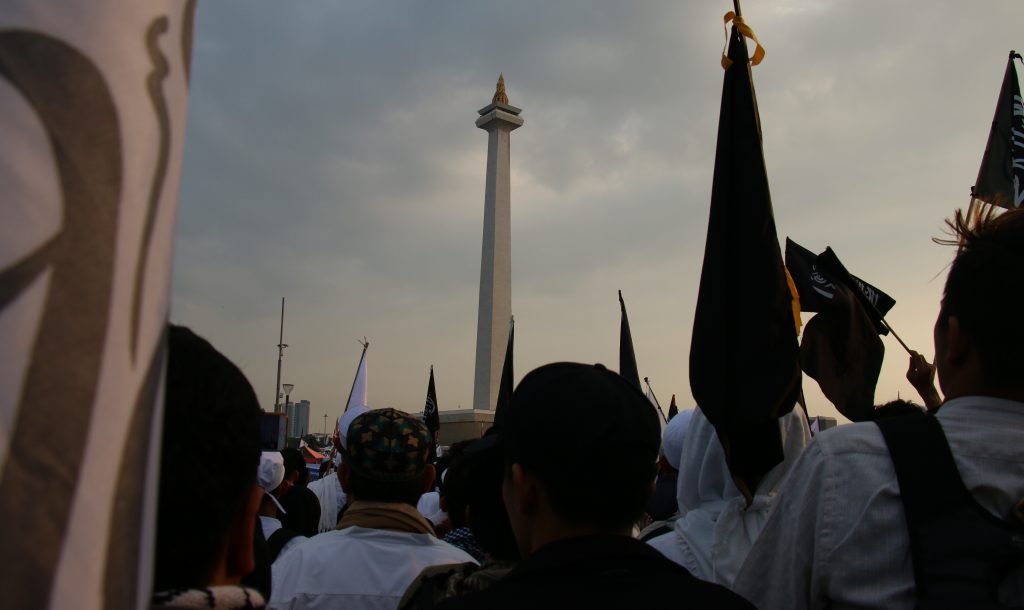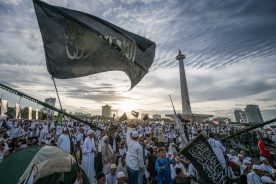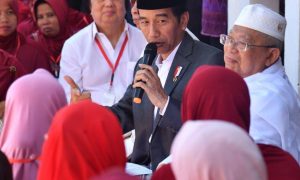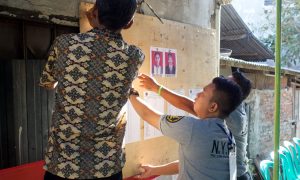There were several reasons to anticipate a modest turnout at the second reunion of the 2 December 2016 anti-Ahok mobilisation. First, that the “212” movement, as it’s since become known, has lost its original raison d’etre of having Ahok prosecuted for blasphemy. Second, that some of main 212 leadership figures withdrew their support for further rallies ahead of 2018’s reunion, on the grounds that the movement had mainly become a vessel for presidential campaigning. These included Kapitra Ampera (the former lawyer of FPI leader Habib Rizieq Syihab, and now a PDI-P candidate) and Usamah Hisyam (chairman of the Partai Muslimin Indonesia/Parmusi). Third, Kyai Ma’ruf Amin—who signed MUI’s 2016 “religious stance” stating that Ahok had blasphemed, and is now President Jokowi’s running mate—voiced his disapproval of the reunion rally.
While the organisers, the police, and Jokowi supporters will naturally disagree about its exact scale, it was clear that 2018’s reunion attracted far more attendees than last year. I arrived inside the National Monument (Monas) compound at 4am and already found it difficult to get within 500 metres of the main stage. Many latecomers were unable to enter the Monas compound, with the crowd spilling out onto surrounding public roads, just as it did in 2016.
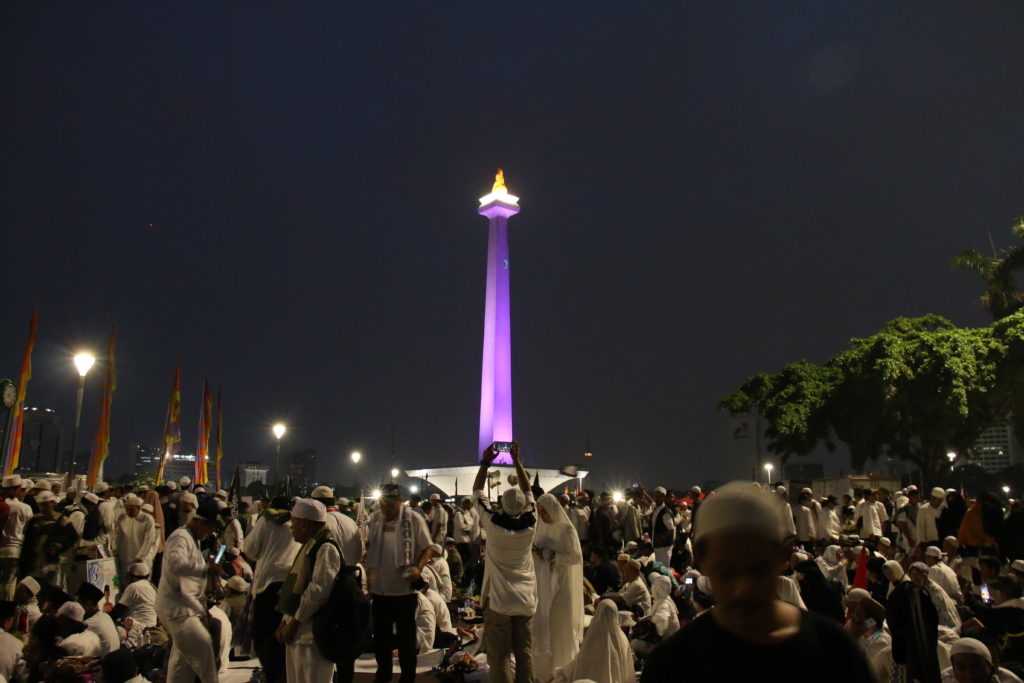
THE CROWD AFTER DAWN PRAYERS, NATIONAL MONUMENT (PHOTO: AZIS ANWAR FACHRUDIN)
Yet while 2018’s anniversary saw the biggest mobilisation since the 2 December 2016 rally, there were at least two significant differences between the character of the original 212 event and the most recent reunion, based on my in-person observations. First, contrary to what was promised by the 212 committee, the tone of last weekend’s reunion was strongly linked to presidential politics and hostile to President Jokowi. Second, its organisation was dominated by the Front Pembela Islam (FPI), in contrast to the more diverse involvement of Islamic organisations witnessed in 2016. Indeed, I would primarily interpret 2018’s 212 reunion as a show of force on the part of FPI—one aimed clearly at demonstrating to the Prabowo Subianto camp the mobilisational potential that FPI can provide if its interests are accommodated.
Election energy
So, what might have been the driving factors behind the surprisingly large turnout? At the most obvious level, we could say that the 212 movement has seized the emotional momentum created by the burning of a “tauhid flag” by members of Nahdlatul Ulama’s youth paramilitary wing, Banser. “Bela tauhid” (defending tauhid) became a new theme for this year’s reunion. Habib Rizieq Syihab composed a bela tauhid marching song, and tauhid flags and hats in various colours appeared in the rally.
But the upcoming election played a larger role in generating enthusiasm. While a recent survey by CSIS shows that a significant percentage of supporters of the 212 movement are likely Jokowi voters—implying that many of them were only against Ahok, not the president—this diversity in the political preferences of 212-sympathetic voters wasn’t reflected in what I saw at the reunion. There, the pro-Prabowo atmosphere was palpable. Of the dozen or so attendees I spoke to about their political opinions, none appeared to support Jokowi. Shouts of “ganti presiden!” (replace the president!) and mocking of “kecebong” (a derogatory nickname for Jokowi supporters) were frequently heard from participants. A lot of people took selfies with their thumb and forefinger, signalling their support for Prabowo. (An amusing aside: tauhid used to be symbolised by the forefinger alone, but now that Jokowi is candidate number 1 on the 2019 ballot, Prabowo’s conservative fans are compelled to change their go-to gesture.)
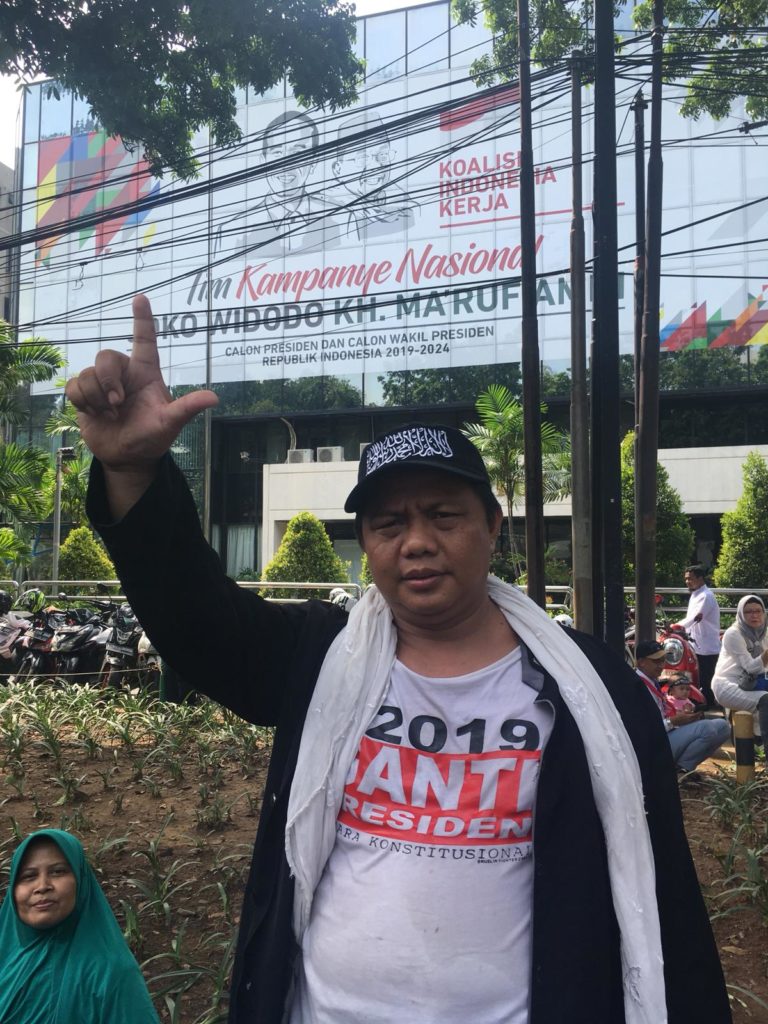
A REUNION MAKING A ‘TAUHID’ SIGN OUTSIDE A JOKOWI CAMPAIGN OFFICE (PHOTO: ROSS TAPSELL)
The presence of politicians from the Prabowo camp amplified the reunion’s political tone. Politicians on stage included Gerindra’s Fadli Zon, PKS’ Hidayat Nur Wahid, and PAN’s Zulkifli Hasan, while there were none from parties of Jokowi’s coalition. In its official statement, the 212 committee cancelled its invitation to Jokowi and his representatives because of their “criminalisation of ulama”.
While most of the religious leaders present avoided overt electoral appeals, some of the most prominent among them did not shy away from political themes. At the climactic session of the event, Habib Rizieq Syihab, speaking from Saudi Arabia via a prerecorded address, elaborated several points about what he perceived as grave current conditions of Indonesia due to the current government’s wrongdoings, before telling attendees:
O, my fellow brothers of the faith and the nation, let’s make a change… in the coming presidential and legislative elections: it is haram (forbidden); once again, it is haram to vote for parties that support blasphemers of religion… let’s vote for the presidential candidate recommended by the ijtima’ ulama [the “consensus of ulama”, referring to the congress of ulama held by GNPF-Ulama in September 2018] and vote for parties of the Keumatan coalition [consisting of Gerindra, PAN, PKS, PBB, and Partai Berkarya] … Are you ready for voting for the presidential candidate from the ijtima’ ulama? Are you ready for sinking the parties supporting blasphemers of religion?”
Rizieq’s remarks are at odds with the organisers’ previous promises not to talk about electoral politics in the rally. In its official statements, the 212 committee said that participants were forbidden to carry any political party flags. Even Prabowo Subianto, in his address to the crowd, avoided recommending himself. Indeed, whether this rally would be simply a reunion or rather a political campaign has been the subject of debate before and after the event. Rizieq Syihab and other speakers’ remarks, and the presence of pro-Prabowo politicians at the event, have prompted authorities to investigate whether there was a violation of the 2017 law on elections, and of a rule from Jakarta’s Election Commission that Monas must be free from electoral campaign activities.
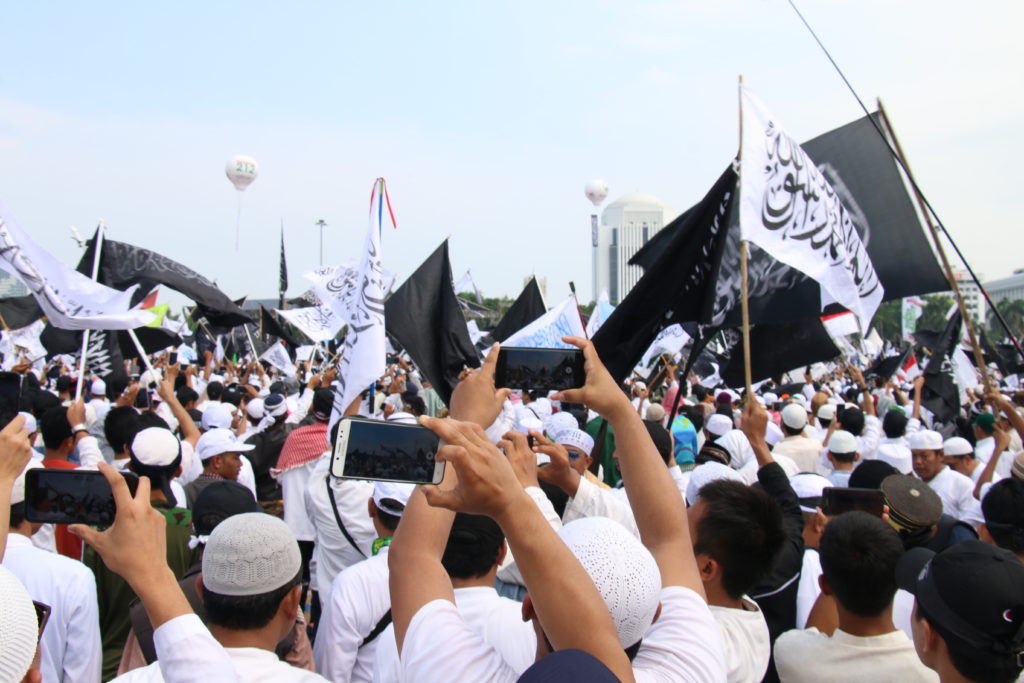
TAUHID FLAGS (PHOTO: AZIS ANWAR FACHRUDIN)
Islamic unity or FPI dominance?
The political tone of the rally, of course, doesn’t mean most attendees came for political purposes. Just as in 2016, many seemed to be sincerely coming for reasons of piety, and to feel the spirit of Islamic brotherhood, treating their journey to Jakarta as some kind of pilgrimage. Indeed, one of the remarkable features of the original 212 demonstration was its ability to unite diverse sections of the Islamic community that are usually rivals for political patronage and for the hearts and minds of Indonesian Muslims.
What about in 2018? Several speakers made unilateral claims about the success of the 212 movement in uniting Muslims across organisations. In his speech, Governor Anies Baswedan put emphasis on the need for unity over Indonesia’s diversity. “God willing,” Anies said, “we will be part of those who safeguard unity in this republic.” Habib Rizieq Syihab suggested a change in the official logo of the reunion event, to refer to “mujahid” (holy warriors of) 212 instead of “alumni” of 212—to attract into the 212 movement those who didn’t join in 2016.
Amid these messages of Islamic unity, however, the 2018 reunion highlighted the dominant role that FPI is playing in mobilising Muslims from across some important ideological and organisational divides through the 212 rallies. The 212 organising committee, known as Persaudaraan Alumni 212 (212 Alumni Brotherhood) is now dominated by leading FPI members. The chairman of PA 212, Slamet Maarif, is FPI’s spokesperson. The laskar (foot soldiers) deployed to handle matters such as security and crowd control were from FPI. Despite my best efforts to look for them in the crowd, I couldn’t see logos of other major politically active Islamic organisations inside the Monas compound. There were indeed many logos of majelis taklim (organisations focused on religious gatherings for reciting the Qur’an and listening to sermons), and Islamic humanitarian organisations. But they cannot be compared in significance with organisations such as NU, Muhammadiyah, or even FPI. There were prominent NU and Muhammadiyah figures on stage, but they were notably not supporters of Jokowi. Leading NU and Muhammadiyah figures have said that they didn’t approve of this reunion, regarding it as unnecessary.
Reflections on a reunion in Jakarta
On the reunion of 2016’s anti-Ahok protests: the ‘awakening’ of Islamic identity means togetherness to some, and division to others.
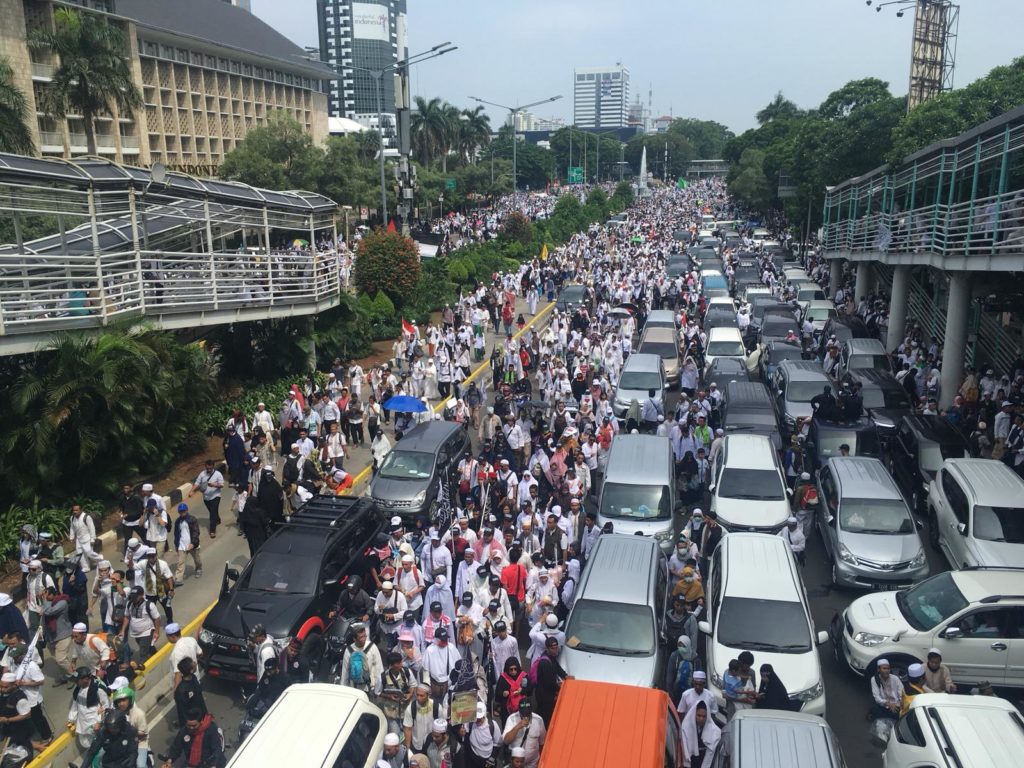
CROWDS ON JL THAMRIN (PHOTO: ROSS TAPSELL)
So, I would interpret 2018’s 212 reunion as more of a show of force on FPI’s part rather than a display of Indonesian Muslim unity. Additionally, it was a consolidation of those willing to join the FPI bandwagon in carrying out its trademark agenda of upholding NKRI Bersyariah—the doctrine that emphasises the first principle of Pancasila (Ketuhanan Yang Maha Esa—belief in god), implying that Indonesia is a religious country, and as such, that its constitution and laws ought not to contradict religious (specifically Islamic) values. This idea was echoed by Tengku Zulkarnain, one of the speakers. “We are responsible for upholding NKRI,” he shouted, “but we don’t want an evil NKRI. We don’t want an NKRI that allows homosexuality.” In Habib Rizieq’s words, “Ayat Suci di atas Ayat Konstitusi”—the “holy verses lie above constitutional articles”.
FPI and the 2019 election
Finally, while FPI was dominant among the organisers, the character of the crowd itself was noteworthy, too. Contrary to some of the prejudices of the 212 movement’s critics, I would argue that it is simplistic to dismiss the 212 attendees as “intolerant”. The committee, arguably pre-empting such criticism, invited figures from various religious backgrounds to attend. Unlike in 2016, no banners displaying racist hatred were seen. There was talk about the Chinese economic grip over the country among some people in the crowd, but these people were few. People were largely friendly to speak to, and the event proceeded peacefully.
Most attendees did not appear to be Salafis (i.e. puritanical in religious practices) either. After arriving at Monas I joined the congregational dawn prayer and, shortly afterwards, the maulidan (celebrating the birthday of Prophet Muhammad). From the qunut (a type of prayer made while standing in the subuh prayer) and the salawat (salutation of the prophet) they recited and sang, I can tell that a lot of participants came from NU backgrounds.
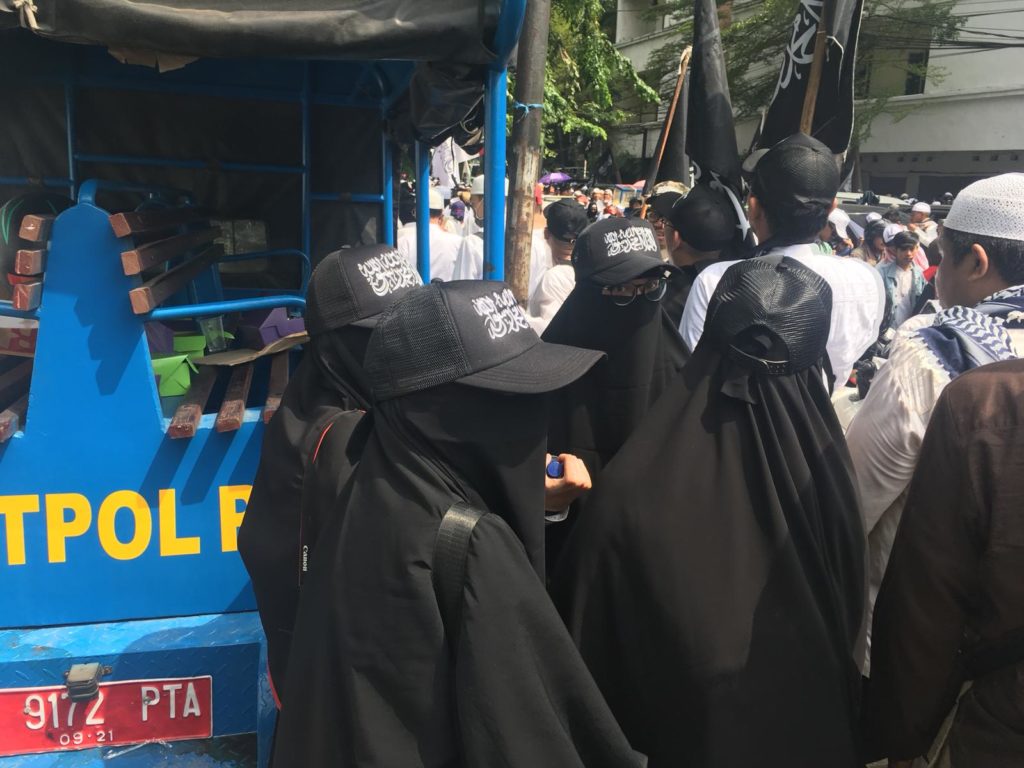
WOMEN IN CADAR AT THE 212 REUNION (PHOTO: ROSS TAPSELL)
This highlights one important fact that is lost on many foreign observers, who often associate Islamic conservatism in Indonesia with Salafism: namely, that FPI shares with NU many ritual practices that are disapproved of by Salafis (such practices being a longstanding source of tension between traditionalist and Salafi communities). Indeed, a lot of women wore face veils (cadar). But the fact that they joined in chanting the salawat usually deemed heretical by Salafis made me withdraw my judgment that they were Salafis. The fact that a lot of men smoked, even in the middle of the crowd, strengthened this impression.
But do these people share FPI’s political agenda? The CSIS poll I mentioned above shows that, while the current 212 leadership is clearly aligning itself with Prabowo, many in the broader community who describe themselves as 212 sympathisers are themselves Jokowi voters. FPI has proven that its mobilisational power is significant, but we don’t yet know whether it can it use this power to steer votes towards its preferred candidate in 2019. Whatever happens, it is certain that the 212 rallies are giving FPI and its campaign of NKRI Bersyariah a prominence they have never enjoyed before in the political and religious discourse of Indonesian Muslims.
 Facebook
Facebook  Twitter
Twitter  Soundcloud
Soundcloud  Youtube
Youtube  Rss
Rss 